 Petzlover
Petzlover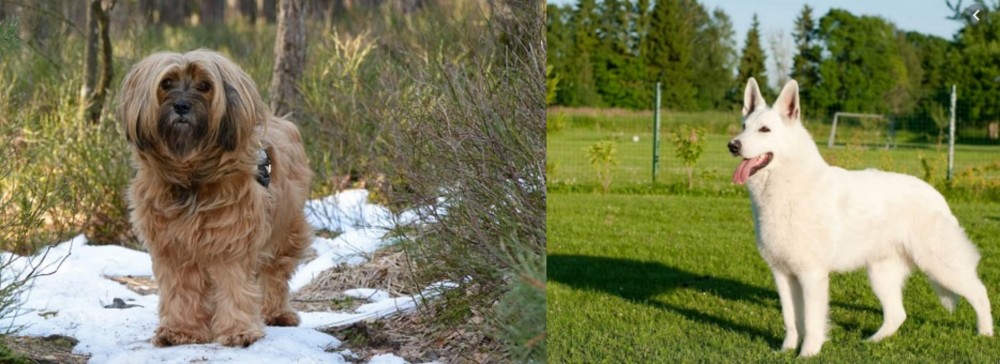 Tibetan Terrier is originated from China but White Shepherd is originated from United States. Tibetan Terrier may grow 24 cm / 9 inches shorter than White Shepherd. Tibetan Terrier may weigh 26 kg / 57 pounds lesser than White Shepherd. Both Tibetan Terrier and White Shepherd has almost same life span. Both Tibetan Terrier and White Shepherd has almost same litter size. Both Tibetan Terrier and White Shepherd requires Moderate Maintenance.
Tibetan Terrier is originated from China but White Shepherd is originated from United States. Tibetan Terrier may grow 24 cm / 9 inches shorter than White Shepherd. Tibetan Terrier may weigh 26 kg / 57 pounds lesser than White Shepherd. Both Tibetan Terrier and White Shepherd has almost same life span. Both Tibetan Terrier and White Shepherd has almost same litter size. Both Tibetan Terrier and White Shepherd requires Moderate Maintenance.
 The Tibetan Terrier is a medium-size breed of dog that originated in Tibet. He has always been kept as a pet and companion for Tibetan monks.
The Tibetan Terrier is a medium-size breed of dog that originated in Tibet. He has always been kept as a pet and companion for Tibetan monks.
He is still a popular companion dog, more so because he is thought to be hypoallergenic, so that even allergy sufferers can enjoy a canine friend.
This isn't a new dog breed, and if you have to go according to records, they have been around for more than 2000 years as herding dogs.
The first Tibetan Terrier was brought to Europe in 1922. The first Tibetan Terriers in the US were imported in 1956 and in 1973 the American Kennel Club recognized the breed. They're classified as a non-sporting breed.
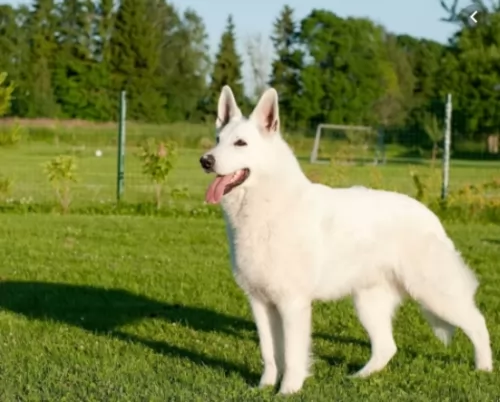 The German Shepherd and the white German Shepherd are the same dog - the only thing is that their coat colors vary.
The German Shepherd and the white German Shepherd are the same dog - the only thing is that their coat colors vary.
The White Shepherd evolved because people were looking for a working companion dog with a high degree of intelligence and a white coat.
The development of the White Shepherd began at the time of the 19th and 20th centuries. A breeding program was started but in 1933, the white coat color was made a disqualification in the German Shepherd Dog breed standard.
Not to be deterred, it was in 1969 that the U.S. and Canada formed White German Shepherd breed clubs and the breed was actually recognized by the UKC in 1999.
 The Tibetan Terrier is a medium-sized dog weighing about 8 – 14kg and standing at about 35 – 41cm in height.
The Tibetan Terrier is a medium-sized dog weighing about 8 – 14kg and standing at about 35 – 41cm in height.
People liken him to the Bearded Collie in looks. The long, shaggy, double coat of the dog is available in a number of colors such as white, grey, golden, black or tri-colored.
The dog is powerful and squarely built with floppy ears and a tail that is well feathered, long and carried curled over the back.
He has always been a dog kept by Tibetan monks. There is nothing aggressive about this dog at all and he is sweet, reserved, gentle and sensitive while also being playful and social with his human family.
These dogs thrive on human companionship and are often used as therapy dogs. He is energetic and active and will require regular exercise. He is able to adjust to life in the city or the countryside, but wherever he is, his exercise needs can never be neglected.
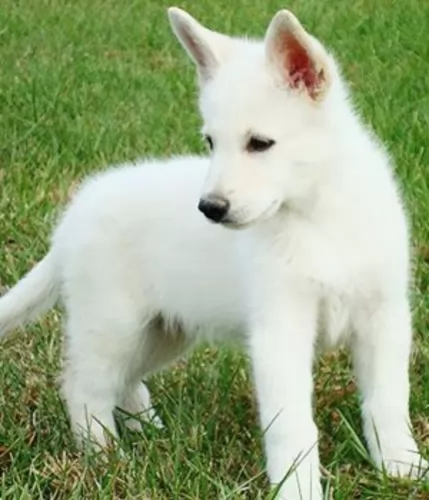 The White Shepherd is a true beauty and is a medium to large-sized dog that is muscular and strong. He stands at between 55 and 65cm in height and weighs between 35 and 40kg.
The White Shepherd is a true beauty and is a medium to large-sized dog that is muscular and strong. He stands at between 55 and 65cm in height and weighs between 35 and 40kg.
He is somewhat longer than tall. The double coat is medium length, dense, straight and white. He is a fairly heavy shedder. He has an intelligent face, a long muzzle and erect ears. The long tail is low-set.
This beautiful dog’s face tells you that he is highly intelligent. He can be easily trained. The bright eyes are eager and alert and he is ready to be an excellent guard dog and take his role as protector and guardian seriously.
The White Shepherd loves his human family and isn't overly enthusiastic around strangers. They’re playful dogs and will make great playmates for children. They also aren’t aggressive with other dogs and will get on well with other pets in the house.
 Tibetan Terriers are loyal ad devoted to their human family. They’re social dogs and won’t do well stuck in the back yard.
Tibetan Terriers are loyal ad devoted to their human family. They’re social dogs and won’t do well stuck in the back yard.
They are sensitive dogs, being able to sense the mood of those whom they love. They also make good watchdogs. They’re ideally suited to people who can give them the attention they crave, making splendid pets and companions.
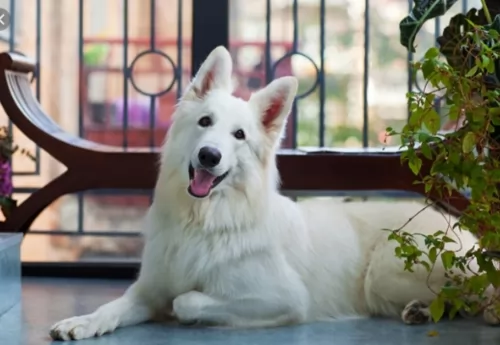 The White Shepherd is such a beautiful dog and he has some great characteristics to match his good looks.
The White Shepherd is such a beautiful dog and he has some great characteristics to match his good looks.
He is friendly and amicable with his human family and is a great protector as well. He isn’t aggressive yet he makes a great watchdog.
He is loving and loyal and forms strong bonds with his human family. Bringing him into your home and heart is guaranteed to confirm the opinion held that dogs are man's best friend.
 Your Tibetan Terrier can live to be between 10 and 14 years of age but even so it is susceptible to a host of health problems. Some of the problems you may have to contend with are hip dysplasia, eye problems and heart murmurs.
Your Tibetan Terrier can live to be between 10 and 14 years of age but even so it is susceptible to a host of health problems. Some of the problems you may have to contend with are hip dysplasia, eye problems and heart murmurs.
This is a serious condition where the femur doesn't fit snugly into the pelvic socket of the hip joint. It can be painful and cause lameness even. Dogs that have hip dysplasia most certainly shouldn't be bred.
Heart murmurs are extra heart vibrations. This is because of a disturbance in the blood flow so as to produce an audible noise.
Sometimes the sound is barely audible but it can also be louder and your pet can show signs of congestive heart failure such as coughing, not being able to tolerate exercise, and being lethargic and weak.
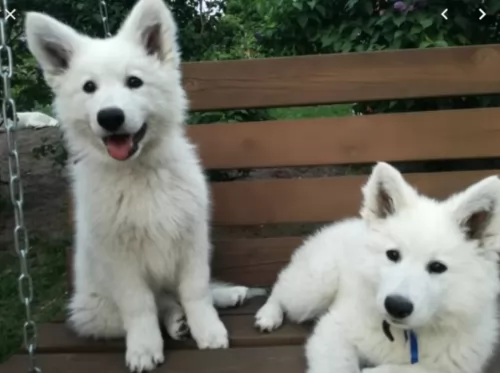 The White Shepherd shares health problems much the same as the German Shepherd, and one of these is hip dysplasia.
The White Shepherd shares health problems much the same as the German Shepherd, and one of these is hip dysplasia.
These dogs are at risk of getting hip dysplasia. It’s a congenital disorder with dogs inheriting the disease from their parents. Some young dogs can get the disease too. Because they are such active dogs, the White Shepherd is at risk of dysplasia. There are a number of signs you can look for in your dog and some of these are -
Your vet may want x-rays to examine your dog's hips. Your vet will want to slow the development of the disease and also ease the pain in your pet. There are other steps the vet will suggest to you that can make it as comfortable as possible for your pet.
 The Tibetan will require good food and exercise to stay healthy. The commercially manufactured dog foods are always a convenient choice, but make sure to give your pet one of the better brand foods, otherwise you feed him a lot of useless ingredients such as fillers, preservatives and colorants from the cheap, inferior brands.
The Tibetan will require good food and exercise to stay healthy. The commercially manufactured dog foods are always a convenient choice, but make sure to give your pet one of the better brand foods, otherwise you feed him a lot of useless ingredients such as fillers, preservatives and colorants from the cheap, inferior brands.
Feed him some home-made food too just to add a little bit of variety to his diet. Boiled chicken, brown rice or pasta and spinach, sweet potatoes and carrots are a healthy choice for your pet.
Avoid people foods such as chocolates, onions, spices, chips etc as these can just upset his stomach and push your vet fees up. Always ensure he has a constant supply of fresh, cool water.
Brush your Tibetan Terrier. He has a long shaggy coat so will require brushing at least twice a week.
Brushing your dog regularly will help to reduce shedding. Many people opt to take the dog to professional groomers and have the coat professionally clipped. The groomers will also trim your dog’s nails and clean the inside of your dog’s ears.
Before you get a dog, make sure you have a reliable veterinarian. It’s no good if your pet becomes ill, maybe even some kind of an emergency, such as bloat, and you don’t know where to take your pet.
You need to be aware of a vet that is open 24/7. Your Tibetan will need to have your vet vaccinate him against some of the deadly diseases there are.
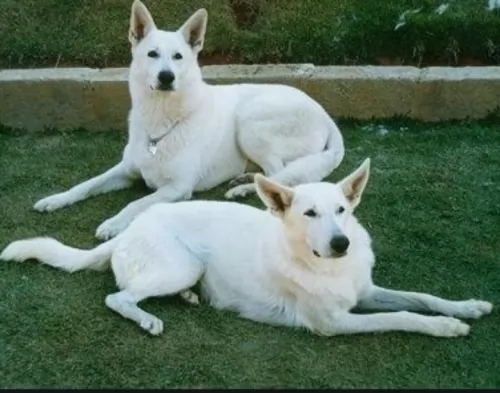 The White Shepherd's weather-resistant double coat will need to be brushed regularly as he is quite a heavy shedder. When brushing him, check for ticks and fleas as well as any unusual lumps.
The White Shepherd's weather-resistant double coat will need to be brushed regularly as he is quite a heavy shedder. When brushing him, check for ticks and fleas as well as any unusual lumps.
This beautiful dog was developed from a herding breed so he is very active. He will love a walk every day but that won’t be sufficient. He just loves ball games, and if you take him to the park, he’ll love you throwing sticks for him or the frisbee.
Because of his intelligence, he will require mental and physical stimulation. You get some toys for dogs where you can put some kibble in the toy and he has to figure out a way to get the food out.
The White Shepherd is an active dog, so to keep him that way, ensure he gets good food which has the right balance of vitamins.
There are good commercially manufactured dog foods on the market, but the idea is to know how to choose the high-quality ones and to avoid the ones that can actually jeopardize your dog’s health.
Always read the write-up on the packaging and choose according to your pet’s age and his activity levels.
It is always a good idea to give such a dog some home-made food too. Not any kind of home-made food either because you have to be careful with dogs to avoid them suffering from abdominal pain. They like their food plain and simple – boiled chicken, brown rice and vegetables.
Some raw meat occasionally is also good. Don’t forget to ensure a constant supply of cool, fresh water.